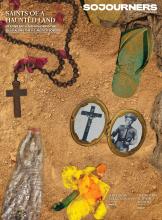NOSTALGIA IS THE LEVERAGE of the powerful. When weaponized, it serves as a deft political tool. It plays on the sentiments of the disgruntled and disenfranchised. It creates a one-dimensional patriotism that never tells the full story. It preserves the story of privilege.
One white comedian reflected, “Here’s how great it is to be white: I could get in a time machine and go to any time, and it would be ... awesome when I get there,” he says. “That is exclusively a white privilege. ... A Black guy in a time machine is like, ‘Hey, if it’s before 1980, no thank you. I don’t wanna go.’” While this made for good comedic insight, many of my siblings of European ancestry who know the history of their ancestors — religious persecution and violence motivated some of their journeys to the shores of North America — also might not want to escape too far back in time.
Read the Full Article

